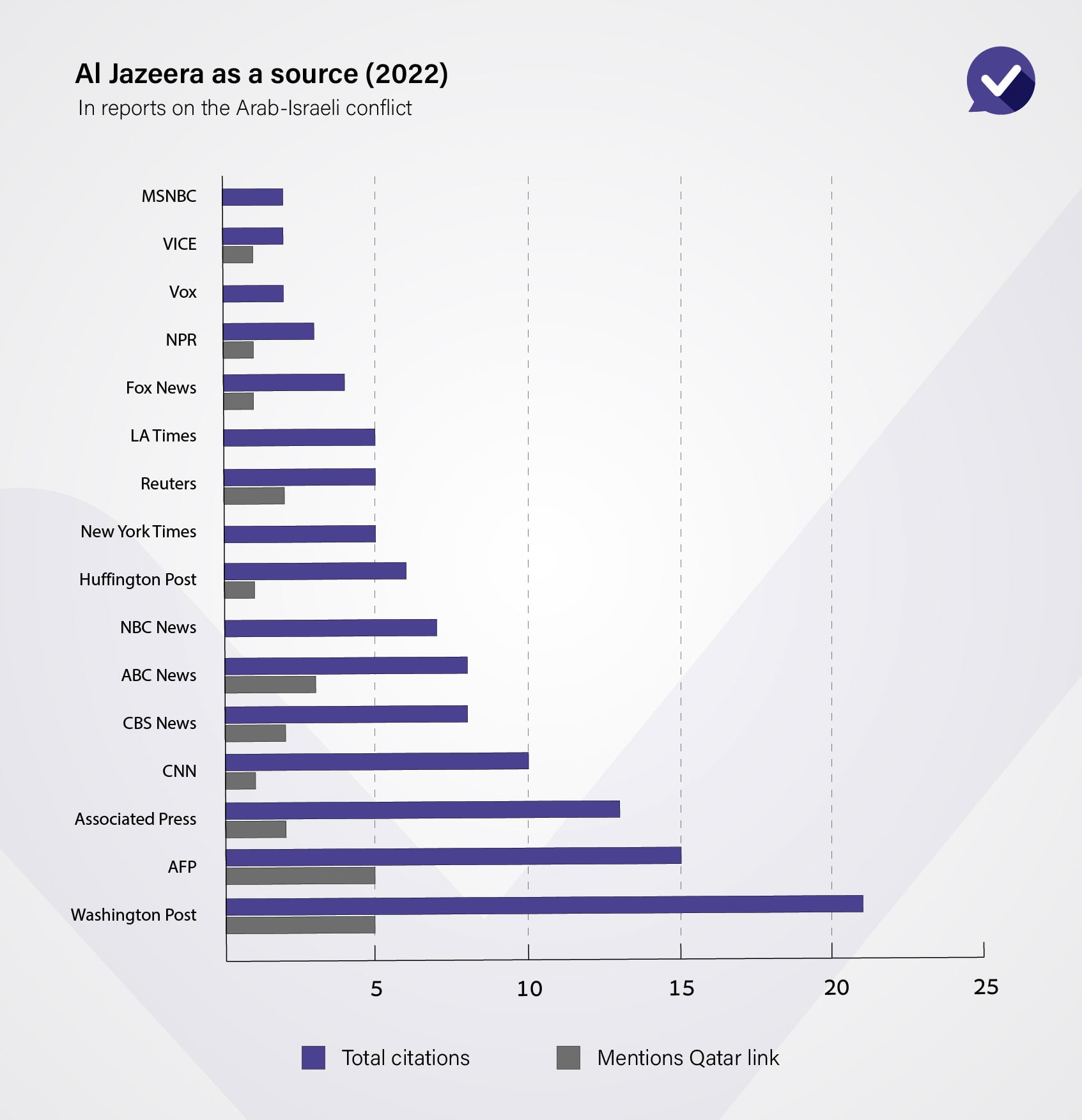Sham Source: Research Shows Media Rely on Al Jazeera for Israel Reports
 by Akiva Van Koningsveld
by Akiva Van Koningsveld
It’s no secret that Al Jazeera isn’t exactly the most trustworthy source of information regarding the Arab-Israeli conflict. The Qatar-owned broadcaster routinely depicts Palestinian suicide bombers as “self-sacrificing fighters,” has repeatedly been forced to take down false stories about the Jewish state, and stands accused of coordinating with the US-designated Hamas terrorist organization.
In 2011, a local Al Jazeera employee even admitted to being a senior operative in the Gaza Strip-based terror group.
Al Jazeera’s allegiance was further made explicit in the aftermath of the May 2021 Gaza war, when Hamas leader Yahya Al-Sinwar praised the channel’s reporting. “Allow me to extend a special salutation to Al Jazeera … Al Jazeera has been the best pulpit to give accurate voice to our position. All hail to you, heroic fedayeen [of Al-Jazeera],” the terror chief stated at a press conference.
In 2010, the US ambassador to Doha explained that Al Jazeera is “heavily subsidized by the Qatari government and has [proven] itself a useful tool for the station’s political masters,” and a former bureau chief for the network once called Al Jazeera “a mouthpiece for Qatari intelligence.” Much like Russia Today and Iran’s Press TV, the network serves as the PR arm of a dictatorship that severely limits freedom of expression within its own borders.
Qatar, which does not recognize Israel’s right to exist and funds Hamas and the international boycott movement against the Jewish state, also has strong ties to the Iranian regime.
Needless to say, Al Jazeera’s lack of independence, coupled with its long history of bias, should disqualify it from ever being used as a primary source by bureau reporters. After all, as the NPR Ethics Handbook warns: “Too often, incorrect information is passed down from one news story to another because of the failure of the first outlet to get it right.”
However, an analysis by HonestReporting indicates that many mainstream media organizations nevertheless rely on Al Jazeera to supplement their reporting on events in the region, often without noting the network’s apparent ideological bent.

An HonestReporting big data search found that in 2022, 16 top-tier news outlets used Al Jazeera at least 116 times as a source in reporting on the Israeli-Palestinian conflict, with The Washington Post, Agence France-Presse (AFP), and the Associated Press (AP) being the most eager to cite Al Jazeera in their online content.
Yet at the same time, fewer than one in four articles mentioned Al Jazeera’s ties to Qatar. Of these 24 pieces, 21 described the broadcaster as “Qatar-based,” while two spoke of “Qatar’s Al Jazeera.” Only one article, a story published by the AFP wire service, correctly noted that Al Jazeera is a “state-owned” enterprise — albeit in the eighth paragraph.
This count, carried out using professional media intelligence tracking software, excludes the numerous TV and radio reports about Israel and the Palestinians that quoted Al Jazeera.
HonestReporting has been at the forefront of addressing Al Jazeera’s slanted coverage of the Arab-Israeli conflict, especially when its incessant libels make their way into the mainstream press.
Our relentless quest to expose anti-Israel bias even forced Al Jazeera to pull a deceptive tweet that suggested Jewish worshipers “stormed” the Al-Aqsa Mosque in Jerusalem’s Old City. In reality, 50 Jews peacefully visited Judaism’s holiest site, the Temple Mount, and were escorted by police for their own protection.
Qatar’s state-sponsored anti-Israel propaganda is “journalism” in name only. So why do mainstream media outlets regard it as anything more than that?
 US Stops UN From Recognizing a Palestinian State Through Membership
US Stops UN From Recognizing a Palestinian State Through Membership Jordan Reaffirms Commitment to Peace With Israel After Iran Attack, Says Ending Treaty Would Hurt Palestinians
Jordan Reaffirms Commitment to Peace With Israel After Iran Attack, Says Ending Treaty Would Hurt Palestinians ‘Crisis at Columbia’: Elite University Spirals Into Chaos Against Backdrop of School President’s DC Testimony
‘Crisis at Columbia’: Elite University Spirals Into Chaos Against Backdrop of School President’s DC Testimony ‘A Time for Vigilance’: FBI Director Says Agency on Alert for Threats Against Jewish Community During Passover
‘A Time for Vigilance’: FBI Director Says Agency on Alert for Threats Against Jewish Community During Passover New Haggadah Released for Israeli Soldiers in Gaza Ahead of Passover
New Haggadah Released for Israeli Soldiers in Gaza Ahead of Passover ADL Data Reveals Alarming Campus Antisemitism, Despite Strong Jewish Life
ADL Data Reveals Alarming Campus Antisemitism, Despite Strong Jewish Life New Hospital Approved for Construction in Southern Israel Amid Gaza War
New Hospital Approved for Construction in Southern Israel Amid Gaza War UN Security Council to Vote Thursday on Palestinian UN Membership
UN Security Council to Vote Thursday on Palestinian UN Membership New Play Opening in NY Recounts Verbatim Testimonies From Oct. 7 Survivors, Families of Victims
New Play Opening in NY Recounts Verbatim Testimonies From Oct. 7 Survivors, Families of Victims




 Google Fires 28 Employees for Protesting Cloud Contract With Israel, Impeding Others’ Work
Google Fires 28 Employees for Protesting Cloud Contract With Israel, Impeding Others’ Work US to Oppose Palestinian Bid for Full UN Membership
US to Oppose Palestinian Bid for Full UN Membership US Announces New Sanctions on Iran After Missile, Drone Strike on Israel
US Announces New Sanctions on Iran After Missile, Drone Strike on Israel ‘A Time for Vigilance’: FBI Director Says Agency on Alert for Threats Against Jewish Community During Passover
‘A Time for Vigilance’: FBI Director Says Agency on Alert for Threats Against Jewish Community During Passover Anti-Israel Activists Protest Outside US, Israeli Pavilions at Venice Biennale, Accuse Jewish State of Genocide
Anti-Israel Activists Protest Outside US, Israeli Pavilions at Venice Biennale, Accuse Jewish State of Genocide